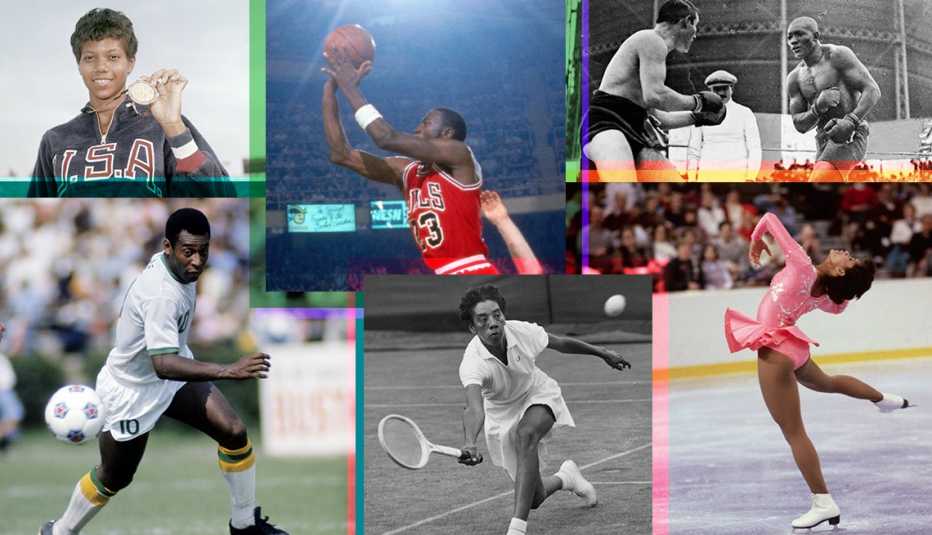AARP Hearing Center


High-achieving Black athletes throughout the decades have been inspired and motivated by those who came before them. Many of these originals were the first professional black athletes in their sports and set examples for fans and future superstars alike.
For AARP, famed athletes shared recollections of these heroes who set records, won championships and made their marks, showing later generations what was possible.
A Tribute to Black Athletes: Kareem Abdul-Jabbar Continues His Fight for Racial Equality


Jackie Robinson
(1919–72) The first Black man to play in Major League Baseball in the modern era, starting at first base for the Brooklyn Dodgers in 1947
Blacks had been told for so long that we couldn't play Major League Baseball with white players. For Black athletes and Black fans, it was a sign of hope and opportunity when Jackie made it there. Most Blacks who were baseball fans then were fans just because of him. We didn't want anyone giving us anything. Just give us a chance.
So, I grew up idolizing Jackie, even though I didn't understand his passiveness. But as I got older, I came to realize that my father had internally absorbed certain negative things in order to succeed, and he taught me that. And that's what Jackie did — he channeled whatever inequalities and anger he felt into excellence on the field.
—Dusty Baker, 71, manager of the Houston Astros, played 19 seasons in Major League Baseball and was a three-time manager of the year in the National League.


Pelé
(1940–) Soccer's first Black global superstar, helping Brazil win the ‘58 World Cup
I was influenced by Pelé through the movie Victory. I couldn't have been more than 12. He was playing himself and was so amazing. I didn't understand that I was watching one of the greatest footballers ever. We didn't have a lot of high-profile soccer players in the U.S., but he inspired so many African American kids to play: He looked just like us! I think people underestimate the power of that.
—Briana Scurry, 49, was the starting goalkeeper for the U.S. women's World Cup championship soccer team in 1999 and is a two-time Olympic gold medalist.


Wilma Rudolph
(1940–94) The first American woman to win three Olympic gold medals, in 1960 in track and field
Wilma inspired a nation and inspired me to do something I didn't know was possible or achievable. Not only was she Black, but she had had polio. She went from not being able to walk to performing in front of the world. She also became my mentor and a friend. When we would discuss her battles against racism, she would always tell me, “Never be bitter — rise above.” That's what I saw in her, even though she was denied eating at a counter because of the color of her skin.
—Jackie Joyner-Kersee, 59, won six Olympic medals in track and field, including three gold.


Jack Johnson
(1878–1946) The first Black world heavyweight boxing champion, in 1908
When I think of Jack Johnson, I think of a Black athlete who saw the world from a far different perspective from even Muhammad Ali in the 1960s. Jack came along only 30-some years after bondage. Reconstruction was slavery by another name. A man like Jack Johnson, living the way he did. … Listen, you were hung for looking at a white woman. It was called reckless eyeballing. Jack married three white women. He died in a car accident when he sped out of a diner in North Carolina that had refused to serve him. No one had ever seen a Black man like him in America. And afterward, they tried to make sure there would never be a Black champion like that again. Then came Joe Louis and Ali. But when I fought, I channeled Jack 100 percent, no doubt about it.
—Mike Tyson, 54, became the youngest heavyweight champion in history, in 1986, at age 20.


Arthur Ashe
(1943–93) The only Black tennis player to win men's singles championships at Wimbledon, the U.S. Open and the Australian Open
Arthur endured in a predominantly white sport. There were events he wasn't allowed to play; he fought his way through it. While doing that, he fought against apartheid in South Africa. When he was at his best, he was fighting for what was right.
He's the reason my father got into tennis and why I got into tennis. My father gave me Arthur's book Days of Grace when I was younger. The more I learned about him, the more impressed I was. He practiced what he preached. So when I would face a racially charged incident — like with Lleyton Hewitt at the U.S. Open in 2001, or my encounter with police in 2015 — I vividly remember thinking, What would make my dad proud? I knew how much he had been inspired by Arthur Ashe.
—James Blake, 41, a former professional tennis player, was named Arthur Ashe Humanitarian of the Year in 2008. He works as an ESPN tennis analyst.







































































More on politics-society
What 'Black Joy' Means and How It Grew
Practice joy and honor the movement by celebrating positive Black experiences
Fantastic Fiction by African American Authors
11 novels we love by Colson Whitehead, Brit Bennett and more
7 Leaders Who Carry on Martin Luther King Jr.'s Legacy
These modern trailblazers continue to work on civil rights issues